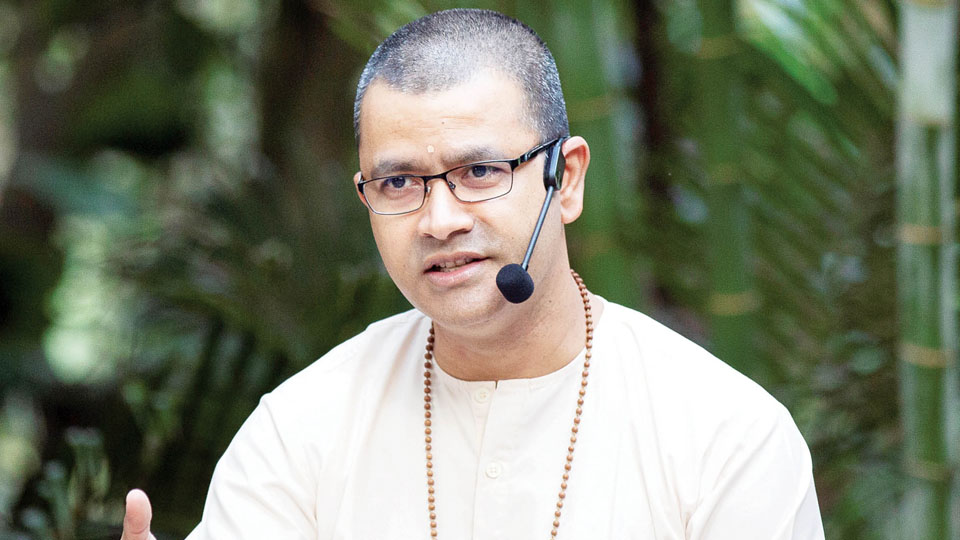Shri Eswaran of Vedanta Institute to deliver Bhagavad Gita discourse at BVB, Mysuru Kendra, on Oct. 26 and 27
Renowned philosopher and disciple of Swami A. Parthasarathy, Founder-Acharya of Vedanta Institute, Bengaluru, Shri Eswaran will be in Mysuru to deliver a special discourse in English on ‘Essence of The Bhagavad Gita’ at Prof. Y.T. Thathachari Auditorium of Bharatiya Vidya Bhavan (BVB), Mysuru Kendra, on Oct. 26 and 27 from 6.45 pm to 7.45 pm. Ahead of the event, Star of Mysore (SOM) had an insightful conversation with Shri Eswaran about his philosophical journey and his thoughts on the timeless relevance of Vedanta for modern life.—Ed
Star of Mysore (SOM): What is Vedanta?
Shri Eswaran: Vedanta is a compound word Veda + Anta. Veda – knowledge, anta – end. So, Vedanta literally means the end of knowledge. It presents the eternal principles of life and living. It enables a life of mental peace combined with dynamic action in the world. It equips one with clarity of intellect to deal with the challenges of life. Above all, it leads one to the ultimate goal of Self-Realisation.
SOM: What is the relevance of Vedanta in our life?
Shri Eswaran: Beyond the challenges of mere survival, a human being faces a range of other issues. Great thinkers universally ponder the foundations of our choices. Change is the essence of existence, and with it comes uncertainty — something the mind naturally fears.
Knowledge of Vedanta helps one to grasp the workings of their mind and intellect, for they shape our decisions. Not only will one rise above the worldly challenges, but one will also cultivate a healthy body, be dynamic in action, have a stress-free mind, a keen intellect, and harmonious relationships.
SOM: What led you to choose the study of Vedanta?
Shri Eswaran: I have been asked this question since the very beginning. In fact, even my father wanted me to pursue Chartered Accountancy (CA), and I often wondered why no one questions careers like CA, Medicine or Law in the same way. At the time, my answer was simply, “I don’t know.”
Much later I read a book titled ‘The Idea of a University’ by John Henry Newman. There he distinguishes between two types of education: “liberal” and “servile.” Liberal education, he explains, is education pursued without an utilitarian purpose, as all knowledge will eventually find its usefulness. The process of learning itself, he argues, must remain liberal — pursued for its own sake without any utility tag attached. However, today, knowledge is sought primarily for its utility. A mind fixated on utility is often closed to true inquiry and investigation.
SOM: What is the purpose of life according to you?
Shri Eswaran: The purpose of life is to live a life of satisfaction, independent of external situations. I am not suggesting that you adopt this as your personal purpose, but rather pointing out that this is what every human being is universally seeking. Understand that wealth, power, position, status or even family are not essential for experiencing true security, peace and happiness.
SOM: Having visited numerous educational institutions to teach, what are your observations about today’s young generation?
Shri Eswaran: The real need in education today is to cultivate adaptability — the ability to unlearn and relearn — which is crucial for the younger generation. This can only be achieved by strengthening the intellect, not merely by acquiring intelligence. Intellect serves two key functions: it helps us acquire knowledge and, more importantly, it governs and guides the senses and mind.
Unfortunately, today’s youth seem content with just gaining skills to earn a living, often becoming completely absorbed in themselves. What they need to realise is that earning a living is very different from living a meaningful life. Current education is promoting intelligence, but not intellect. This is a major cause of many modern problems.
SOM: We see a sharp increase in disharmony and divorce. What is your advice for maintaining an amicable relationship?
Shri Eswaran: Essentially, one must understand it is not the person to whom you relate that brings happiness, it is how you relate. The basis for any relationship should be love, not attachment. Attachment is nothing but an expectation of happiness, peace, and security through bondage, and dependency. One’s mind demands more attention to oneself than anybody else; that others should be available at one’s beck and call. We should learn the art of relating without suffocating the other or binding the other, nor becoming dependent on the other. At the same time not being indifferent. This is Love. Normally one is expressing attachment but calls that love. Let gratitude be the foundation of all your relationships.
SOM: Are you married?
Shri Eswaran: Yes. I have a daughter too. I believe everything happens according to a plan of life. And marriage is a part of the plan. That’s something my Guru explained, as he knew I was interested in the Vedanta way of life. He told me that marriage would not be a hindrance. In fact, he said marriage is the first step to practice Bhakti Yoga, you just have to accommodate one more person in your life that would help you to learn values and implement them in life. —OSR








Recent Comments